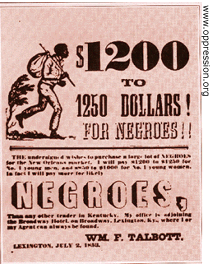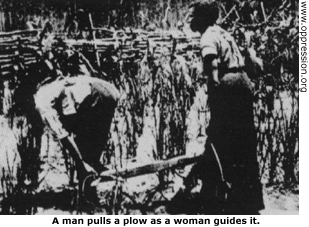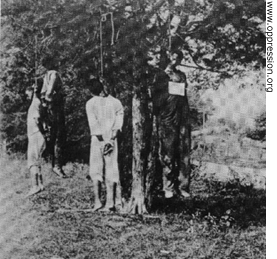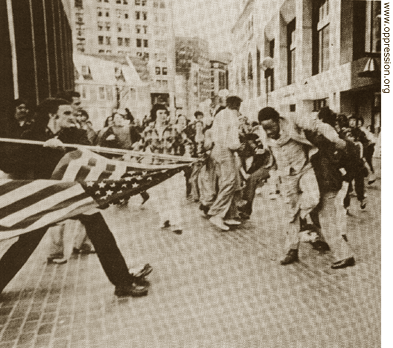|
|
BLACK AMERICANS:
Prisoners of Socio-Economics
Cycles
|
|
| As we study the history of African cultures in
their times ory and times of extreme deprivation and oppression, one persistent
characteristic stands out, whether we examine sub-Saharan African cultures
or north African cultures, and that is the prevalence of a traditional
value framework which nurtures individual character and personality development
and simultaneously gives collective religious, political, economic and
aesthetic direction. Furthermore, because of the persistence of a traditional
value framework, great cultural achievements were made in all fields of
learning and, because of those same values, there was always grass-root
resistance during times of oppression or colonialism. |
In South Africa, the Bantu and Zulu tribes resisted
the encroachments of the British and Dutch colonialists within a cultural
value framework which was of their own genius, and today their struggle
goes on because they have not abandoned their value framework. For instance,
the communities of Mali, Songhay, and Ghana were great because of a unifying
value framework which reinforced the identity of their people throughout
their history. Incidentally, this value framework had grown out of the
discovery of Islam. |
| When we consider those African people who were enslaved in North America,
beginning in 1619, we are considering a real holocaust - a holocaust unparalleled
in the history of humanity. This holocaust cannot be understood outside
the context of global history during the period between the 15th and 20th
centuries. It was a real holocaust because it stripped millions of human
beings of their ethnic memory, erasing the sense of self-origin, self-purpose,
and self-destiny.
It is obvious that there exists an attempt to play down the real holocaust
and its effects by focusing on the so-called benefits of life in the United
States. This, however, amounts to a gross misinterpretation of the living
conditions of Africans in America. We are being told that conditions are
getting better for us and, to highlight this big lie, news media agencies
ignore the real life conditions of most Africans and instead emphasize
the material success of a few comedians, news and sports casters, athletes,
and entertainers.
We have a few radio stations, a handful of mayors, and some local bureaucrats
who administer federally-funded programs for the minority poor. But if
we look behind the appearances which tend to  obscure
the reality of our condition, we see that what such figures actually represent
are co-opted negroes who have failed to articulate the demands of our people,
and co-opted negroes who have failed to apply the methods which would give
us self-determination in our communities. obscure
the reality of our condition, we see that what such figures actually represent
are co-opted negroes who have failed to articulate the demands of our people,
and co-opted negroes who have failed to apply the methods which would give
us self-determination in our communities.
The deliberate policy of co-opting a large percentage of Black intellectuals
on the part of the government and corporations of the United States has
stifled our movement to freedom and dignity, Consequently our history has
neither been accurately articulated nor interpreted, particularly with
respect to a framework of values.
History is the chronological listing of past events and it is simultaneously
the written perception of those past events. It is a listing and perception
all too often conditioned by prejudice, myth, and/or lack of vision. History,
as it is selected and perceived, therefore, is highly inaccurate in its
portrayal of our experiences in America. It is not difficult to understand,
then, why there is acquiescence on the part of the African people in the
face of socio-economic injustice, horrendous poverty, and duplicity of
federal and state governments in America.
If, therefore, we are to see clearly the events of the past and assign
to such events their proper weight in the determination of our present
circumstances, we must purge from our God-given minds the historical lies
which have been fed to and continue to feed them. We must release our minds
to seek out in our past the nature and destiny of our present. It is no
easy task to purge the mind of the conditioning to which it was and is
subject.
It is no easy task to sever the tie which the mind has to the social
apparatus of America, a social apparatus which through brutal force, puppet
leaders, and lies has led the masses further and further down the politico-economic
scale. This social apparatus has sought in the past and seeks in our time
consistently to disembowel meaning from our history and to leave it hollow
and impotent in the face of modem challenges.
How do we begin to recapture this meaning? We must get at an understanding
of our history, our past; we must strip such past of the myriad myths covering
its true structure. Do we begin with devils and bogeymen, or with courage
and struggle? We must have the courage to rediscover the African culture
from which we were forcibly taken; the courage to see the brutal socio-economic
structure of a slave economy which successfully stripped us of a knowledge
of self. Consequently, one must ask, "Do we seek a knowledge of our
past in the facts of our past - facts as causes and effects?" Then
upon such a basis of factual observations,, we must bring to light reasons
for our present circumstances.
In his article entitled: "A Survey of Islam and the African Diaspora,"
Clyde Ahmed Winters states,"...the fact remains that Arabic and Islam
has been one of the major vehicles of exchange among African people in
Africa and in diaspora. This is supported by the fact that the majority
of both the earliest and latest slaves to arrive in the Americas, came
fromwhat European geographers of the eighteenth and nineteenth centuries
called Senegambia, Sudan, and upper Guinea regions of west Africa..."
[1]
|
Now, three hundred and sixty-three years have
passed since the first Africans were brought to the unloading docks of
North America as slaves for the then British colonies. The position of
Africans in the northern hemisphere then as well as now reflected the same grim fact, a fact that we often overlook out of sheer frustration
and/or powerlessness, that the first Africans brought and bought here were
prisoners as a consequence of European economic necessity. The wheels of
the Industrial Revolution were slowly but surely beginning to turn, and
cotton was the principal product of the English economy, the basis of which
was labor-cheap or slave. Those first Africans were prisoners of a socio-economic
system which by design was purposely incapable of rendering justice and,
therefore, equal opportunity to Africans as well as other poor minorities.
They were prisoners more of a system of calculated oppression than of their
own failings as human beings, though the latter idea of African inferiority
would soon be propagated and eventually become the rationale justifying
the institution of slavery in America.
the same grim fact, a fact that we often overlook out of sheer frustration
and/or powerlessness, that the first Africans brought and bought here were
prisoners as a consequence of European economic necessity. The wheels of
the Industrial Revolution were slowly but surely beginning to turn, and
cotton was the principal product of the English economy, the basis of which
was labor-cheap or slave. Those first Africans were prisoners of a socio-economic
system which by design was purposely incapable of rendering justice and,
therefore, equal opportunity to Africans as well as other poor minorities.
They were prisoners more of a system of calculated oppression than of their
own failings as human beings, though the latter idea of African inferiority
would soon be propagated and eventually become the rationale justifying
the institution of slavery in America.
It was labor which the plantation owners needed if they were to cultivate
and expand their properties. Profit was their motive. Firs t, there were
indentured servants from Europe, then slave labor from Africa. If we examine
the facts of history with a clear mind, then we see an economic cause for
slavery which makes it more than just a matter of color. Indeed, we see
a vicious economic system, an economic cause for slavery which makes it
more than just a matter of color. Indeed, we see a vicious economic system,
an economic system "red in tooth and claw," an economic system
non-discriminatory with regard to the color of flesh it gathered into its
markets of human commodities. It was the same economic system which in
Europe forced thousands of innocent European men into the galleys of ships
in a condition of manifest slavery under the pretense of punishment. Otto
Kirchheimer, in Punishment and Social Structure comments: "What is
significant in the development of the galley as a method of punishment
is the fact that economic considerations alone were involved, not penal
the introduction and regulation of galley servitude were determined soley
by the desire to obtain necessary labor on the cheapest possible basis."(2)
It is the same economic system which implemented the enclosure laws of
England right up till the 19th century. Ultimately the enclosure laws herded
thousands upon thousands into the musty factories of England working for
little more than nothing. Such exploitation in Europe was contemporary
with the enslavement of Africans in America; the enslavement of Africans
was not, therefore, an isolated event existing in uacuo, but rather was
an event interwined with the major historical developments of the time.
The question emerges: Is race the cause or a cover-up of the real nature
of our grotesque predicament in America? A clue to the answer may be gleaned
from a statement made by A. Leon Higginbotham, Jr. in his book, In the
Matter of Color, "During most of the seventeenth century, a fierce
international struggle was raging on the west coast of Africa between powerful
European trading combinations, each trying to corner the markets that supplied
slaves for the new world." [3]
The Quran answers that race was not the cause. Allah says in the Quran:
"Mankind was one community. Then they differed among
themselves, so Allah raised Prophets as bearers of good tidings and as
warners." (2:213)
This verse from the Quran clearly expresses the original unity of all
peoples and points out the reason for oppression and exploitation. Such
of course stemmed from differences not of a physiological kind, but rather
from differences of belief manifested in the form of social injustice.
|
| But how was this fact covered up? That question is not difficult to
answer. It was through their legal institutions and educational institutions
that the plantation owners and later the industrialists covered their bloody
trail of murder which stretched to the very shores of Africa. Their legal
dogma gave legitimacy to the consistent degradation of Africans and furthered
conflict between Africans and Whites in America. Again as Higginbotham
observes: "What does matter is that in constructing the legal system
to entrench non-white servitude and limit and dehumanize non-whites, the
white colonists were forced to confront the basic flaw in all systems of
subjugation. There can be no successful, peaceful coexistence between master,and
slave; between those who are always considered human and those beings who
are sometimes animal and sometimes human, who are bought and sold like
chattels and sometimes able to own chattels, and who are sometimes bound
as perpetual slaves and sometimes free." [4]
There are some who would have us believe that slavery ended with the
emancipation proclamation. They would have us believe that the civil war
was fought principally for our freedom, and that afterwards as freed slaves
our ancestors rode off into the sunset singing Christian hymns and holding
in each hand the Constitution of the United States and the Bill of Rights.
They would have us believe that Abraham Lincoln was our President of Grace.
Well, such an explanation of the so called emancipated slave, more accurately
described as the "free slave," is as erroneous as the theory
of African cultural inferiority. The Civil War was a conflict precipitated
by the Industrial Revolution and the resistance of an agrarian South to
change accordingly. It did not, however, effect qualitative changes in
the life of Africans in America. If the Emancipation were genuine, if the
law were really on your side because of Lincoln's love for you, then how
nearly sixty years later, could another president (Harding) stand before
a throng of people and say: "...the negro is entitled to full economic
and political rights as an American citizen this does not mean 'social
equality.' The white man and the negro also should stand, uncompromisingly
against every suggestion of social equality. Racial amalgamation can never
come in America." After warning the African people that social equality
was a dream that could not be realized, President Harding went on to say:
"It is probable that as a nation we have come to the end of the period
of very rapid increase in population. Restricted immigration will reduce
the rate of increase, and force us back on our older population to find
people to do simple, physically harder manual tasks. This will require
some difficult readjustments. In anticipation of such a condition the South
may well recognize that the North and West are likely to continue their
drafts upon its colored population, and that if the South wishes to keep
its fields producing and its industry still expanding it will have to compete
for the services of the colored man. If it will realize its need for him
and deal quite fairly with him, the South will be able to keep him in such
numbers as your activities make desirable." [5]
such an explanation of the so called emancipated slave, more accurately
described as the "free slave," is as erroneous as the theory
of African cultural inferiority. The Civil War was a conflict precipitated
by the Industrial Revolution and the resistance of an agrarian South to
change accordingly. It did not, however, effect qualitative changes in
the life of Africans in America. If the Emancipation were genuine, if the
law were really on your side because of Lincoln's love for you, then how
nearly sixty years later, could another president (Harding) stand before
a throng of people and say: "...the negro is entitled to full economic
and political rights as an American citizen this does not mean 'social
equality.' The white man and the negro also should stand, uncompromisingly
against every suggestion of social equality. Racial amalgamation can never
come in America." After warning the African people that social equality
was a dream that could not be realized, President Harding went on to say:
"It is probable that as a nation we have come to the end of the period
of very rapid increase in population. Restricted immigration will reduce
the rate of increase, and force us back on our older population to find
people to do simple, physically harder manual tasks. This will require
some difficult readjustments. In anticipation of such a condition the South
may well recognize that the North and West are likely to continue their
drafts upon its colored population, and that if the South wishes to keep
its fields producing and its industry still expanding it will have to compete
for the services of the colored man. If it will realize its need for him
and deal quite fairly with him, the South will be able to keep him in such
numbers as your activities make desirable." [5]
|
 |
| Here, then, is how the African was defined in
a mere sixty years after the Emancipation proclamation: First, he was defined
as having full economic rights and political rights. History demonstrates
that the African after the Civil War did indeed have the economic freedom
to choose to whom he would become indebted - very often as a sharecropper
on the very same plantations he had worked as a slave. Further, he had
the economic freedom to "consume," a role which is essential
to the type of economy to which he was subject. Secondly, he was seen as
a vote to be wooed by both. Democratic and Republican parties- Thirdly,
he was viewed "like" an American citizen but not an American
citizen. Fourthly, he was one who had no equal share in the wealth nor
the power of the United States. Finally, he was stereotyped as a physical
laborer shuffling eastward, westward, southward, and northward in "such
numbers as activities made desirable." So there, Marginal Americans.
Immitators of the real Americans. Is that our destiny in America? Is it
a so-called democratic process which is supposedly based upon representation?
In 1980, there were only 17 Congressmen and no Senators of African descent,
and all of the congressmen were a bunch of co- opted negroes. Only 3,000
Africans hold elective office nation wide on the local level. And you can
see from the example of Oakland, California, that nothing has changed for
African people. We are 30 million, and those elected politicians represent
only a drop in the bucket of the total. We, on the other hand, constitute
12% of the total U.S. population. The historical and contemporary fact
is that Africans have been and remain a vitally large percentage of consumers
in the American economy. It is a role not unlike that played by our brothers
and sisters throughout the entire underdeveloped world. We are for all
intents and purposes no better off than our brothers and sisters suffering
under apartheid in South Africa.
Now, if the legal system is a by-product of the economic system, if
it is but a framework of laws protecting the economic system and, of course,
the privileges of those who benefit from such an economic arrangement,
then how can the core problems of Africans and poor minorities be solved
through the judicial or legal institutions of America? If we seek social
justice, we should want such justice to be translated into real terms which
increase the quality of life for Africans in America. Unless justice is
translated into terms which rectify the gross economic inequalities, the
Civil Rights legislation will always be of a transient nature because the
basis of this society, its design, has not been changed. Inevitably, the
pattern of advance and set-back will persist until we see this historical
fact clearly and set out to uproot its cause.
Within the last three hundred and sixty-three years, Africans (and more
recently other minorities) have experienced the travail of slavery, the
cruelty of so-called Emancipation, the fear of indiscriminate mob lynching,
mass unemployment, lack of education, ghettos of the most despicable kind,
drug addiction on a scale heretofore unknown, insanity, and suicide. Such
has been the historical experience of Africans in America and, after almost
thirty-one years of Civil Rights struggle, we now see clearly the role
of the American judicial system. We now see clearly the fact which history
has demonstrated to us unabashedly that there will be no cessation of these
dehumanizing experiences, that for us and generations to follow, under
present conditions, there will be no public peace, nor peace of mind in
our time.
The mass migration of Africans into the large urban centers of America
during this century may be the last stage in the extirpation of the African
man in America. Our movements across the United States have been movements
engendered by the cycles of socio-economic influences in the United States,
over which we have been powerless. Like a herd, we have been prisoners
of these socio-economic cycles - fleeing pursuit here, only to be the quarry
there. This of course, at once invokes the notion of fate, absurd prophesies
stating that it was divinely ordained that we would be victimized in such
a way. God is not wronging us, on the contrary, a bunch of white racist
capitalists are destroying us slowly. For Allah says in the Quran:
"Certainly Allah wrongs not men at all, but men
wrong their own souls" (10:45).
Salahuddin Ansar
Sources:
1. Cylde Ahmed Winters, "A Survey
of Islam and the African Diapora." 1975
2. Otto Kichheimer. Punishment and Soical
Stucture. New York: Russell and Russell, 1939.
3. A. Leon Higginbotham. In the Matter
of Color. New York: Oxford University Press, 1978.
4. Ibid
5. New York Times, Oct. 1921. president
harding's speech in Alabama.
|
|
© 1999 Oppression.org.
All Rights Reserved.
Site designed and maintained by Visual
Artifax
|